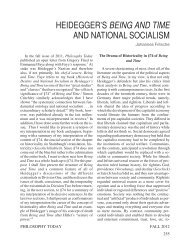Why Saying “I'm Sorry” Isn't Good Enough: The Ethics of Corporate ...
Why Saying “I'm Sorry” Isn't Good Enough: The Ethics of Corporate ...
Why Saying “I'm Sorry” Isn't Good Enough: The Ethics of Corporate ...
Create successful ePaper yourself
Turn your PDF publications into a flip-book with our unique Google optimized e-Paper software.
<strong>Ethics</strong> <strong>Corporate</strong> Apologies<br />
after the Fukushima nuclear disaster, the Japanese people clearly wanted TEPCO<br />
executives to specify precisely what they were going to do to get the radiation under<br />
control. Even if the apology by TEPCO’s CEO had been textbook perfect in other<br />
respects, it might still have failed to restore trust with many recipients because it simply<br />
was not clear after the fact how and whether the effects <strong>of</strong> the disaster could be lessened,<br />
much less reversed. Trust needs to be restored because harm has been done by the firm;<br />
some <strong>of</strong> that harm can be viewed as voluntary (e.g., TEPCO executives’ early choice to<br />
defer some containment measures because they wanted to preserve the economic value <strong>of</strong><br />
the plants). xvi However, no one knows exactly how to remedy the primary ongoing harm-<br />
-continuing emissions <strong>of</strong> radiation into the atmosphere and sea. At this juncture, making<br />
an ethically good apology containing all <strong>of</strong> the elements specified above may be close to<br />
impossible.<br />
We must also remember that CEOs do not get to choose their audience. How a given<br />
audience construes itself will affect how the apology is heard and how persuasive it<br />
ultimately turns out to be. Fehr and Gelfand’s (2010) experiments suggest that listeners<br />
who are especially relationship-centered want to hear ample evidence <strong>of</strong> the speaker’s<br />
empathy with those harmed; apology recipients who are more individualistic want to hear<br />
more from the apologizer about compensation. So, although I would argue that ethically<br />
good apologies tend to possess many or all <strong>of</strong> the above elements, some elements <strong>of</strong> the<br />
apology may need to be stronger or more developed for certain audience members.<br />
Cultural differences affect what an audience will accept as a genuine apology: “Japanese<br />
apologies are more apt to communicate submissiveness, humility, and meekness whereas<br />
Americas are more apt to communicate sincerity” (Lazare, 2005, 33). Placing tremendous<br />
42

















